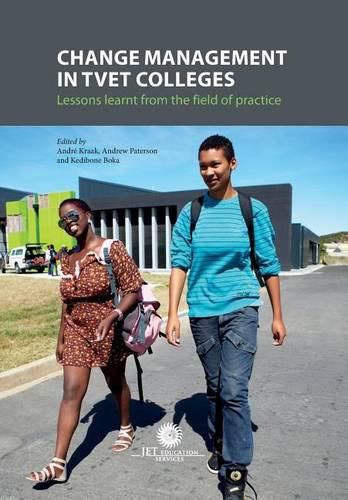Readings Newsletter
Become a Readings Member to make your shopping experience even easier.
Sign in or sign up for free!
You’re not far away from qualifying for FREE standard shipping within Australia
You’ve qualified for FREE standard shipping within Australia
The cart is loading…






This title is printed to order. This book may have been self-published. If so, we cannot guarantee the quality of the content. In the main most books will have gone through the editing process however some may not. We therefore suggest that you be aware of this before ordering this book. If in doubt check either the author or publisher’s details as we are unable to accept any returns unless they are faulty. Please contact us if you have any questions.
The Technical and Vocational Education and Training (TVET) college environment is marked by increasingly stark juxtapositions between what needs to be achieved in the post-school education sector and the increasing difficulty of current conditions. The ‘triple challenge’ of poverty, inequality and unemployment weighs heavily on the social, political and economic fabric of the country and expectations are high that the TVET colleges can make a pivotal contribution to counter these challenges. Despite laudable increases in TVET enrolment, the education system needs to work harder to accommodate the weight of demand for post school further education and training (FET) band qualifications from young people not in education, employment or training. At the same time, it is vital to secure adequate quality in TVET programmes which depend so much on the competence and commitment of college lecturers. This collection offers a set of research papers that provide new analytic and empirical material on:
The political economy of TVET types in different countries which, by comparison, illuminate the South African case;
A periodisation of government interventions in the TVET sector over the last three decades;
The unsettled state and status of TVET lecturers in relation to their job requirements and conditions of service;
The halting evolution of collegial relationships between college lecturers towards higher collegiality;
Employer expectations of college graduates and how colleges are responding; and
An analysis of the outcomes of a college improvement intervention in Limpopo and the Eastern Cape.
This book will offer valuable information and insights for decision-makers as well as analysts of institutional change concerning links between education and economic growth, with particular regard to TVET graduates’ employment rates.
$9.00 standard shipping within Australia
FREE standard shipping within Australia for orders over $100.00
Express & International shipping calculated at checkout
This title is printed to order. This book may have been self-published. If so, we cannot guarantee the quality of the content. In the main most books will have gone through the editing process however some may not. We therefore suggest that you be aware of this before ordering this book. If in doubt check either the author or publisher’s details as we are unable to accept any returns unless they are faulty. Please contact us if you have any questions.
The Technical and Vocational Education and Training (TVET) college environment is marked by increasingly stark juxtapositions between what needs to be achieved in the post-school education sector and the increasing difficulty of current conditions. The ‘triple challenge’ of poverty, inequality and unemployment weighs heavily on the social, political and economic fabric of the country and expectations are high that the TVET colleges can make a pivotal contribution to counter these challenges. Despite laudable increases in TVET enrolment, the education system needs to work harder to accommodate the weight of demand for post school further education and training (FET) band qualifications from young people not in education, employment or training. At the same time, it is vital to secure adequate quality in TVET programmes which depend so much on the competence and commitment of college lecturers. This collection offers a set of research papers that provide new analytic and empirical material on:
The political economy of TVET types in different countries which, by comparison, illuminate the South African case;
A periodisation of government interventions in the TVET sector over the last three decades;
The unsettled state and status of TVET lecturers in relation to their job requirements and conditions of service;
The halting evolution of collegial relationships between college lecturers towards higher collegiality;
Employer expectations of college graduates and how colleges are responding; and
An analysis of the outcomes of a college improvement intervention in Limpopo and the Eastern Cape.
This book will offer valuable information and insights for decision-makers as well as analysts of institutional change concerning links between education and economic growth, with particular regard to TVET graduates’ employment rates.